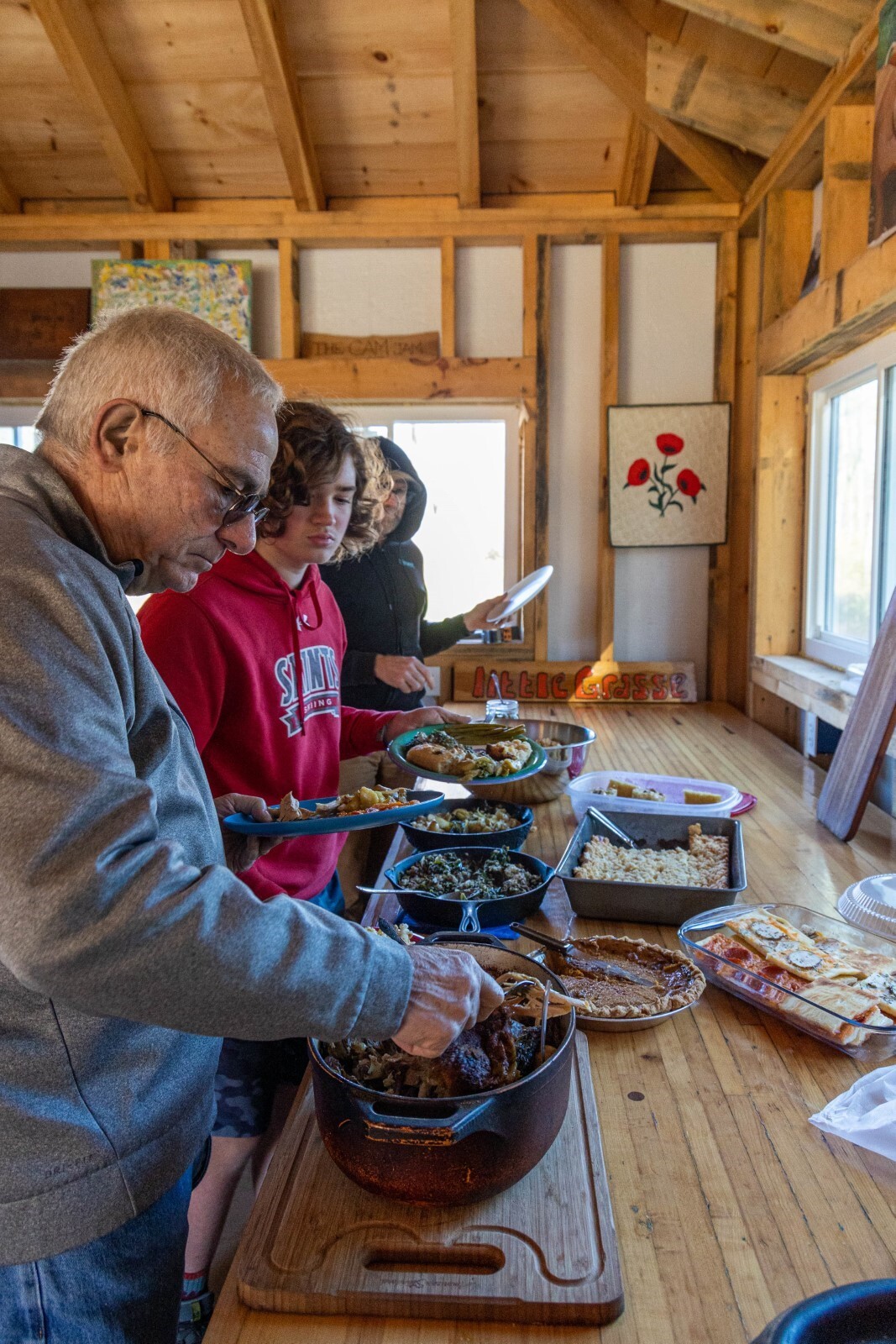littleGrasse Foodworks
Cultivating Carrots and Community
The air is chilly and a sharp breeze rips across the fields, spinning hay into the air and causing no-till tarps to slap hard against the ground. Fall has finally settled into the North Country, but that doesn’t mean the work for farmers is done. Instead, it creates a sense of urgency. “Calvin, can you help me cut a couple of strings here?” a mother says to her high-school-aged son. “There are three in there we missed.”
“They like to hide in there, don’t they?” he responds, carefully cutting the dead tomatillo plants away from the trellis, which, even after death, the plants cling to. The earthy smell of the decaying plants rises into the air as the stems are wrestled from their summer home and piled for composting. Today is the last Garden Morning of the season, meaning the share season at littleGrasse Foodworks is coming to an end. Garden Mornings—where members of the share program have the option to gather at the farm once a month to help with chores—are a staple for this Community Supported Agriculture program.
“You can’t put a value on the relationship between people and their food,” says Bob Washo as he looks out his living room window over one of the many fields that make up the farm. Mist cascades from the sky, settling on the cover crop of rye that currently serves as a blanket for the soil. “CSA was meant to be a paradigm shift from our economy.” He takes a deep breath and tussles the hair on Millie, his English Shepard Retriever’s, head. “Take the value out of the carrot and put it into the people who farm it,” he says. Since the farm started, the decommodification of food has been the goal of littleGrasse Foodworks. Instead of cultivating products, Washo and his partner, Flip Filippi, aim to cultivate relationships between the land, people, food and the environment.
CSA is a program adopted by over 2,500 farms nationwide. It allows members of the public to purchase shares at the start of the year, providing them with fresh, locally produced food throughout the season. At littleGrasse, Washo and Filippi receive a set fee from each shareholder at the beginning of the growing season in exchange for what they call a “Free Choice share”. They use this money to plan the year, determining how many crops they can grow and the best methods for growing them. “Their philosophy is different from most CSAs; they don’t sell, all of the food is for the members,” Jim Defranza, a member and longtime friend of Washo, says. “I can come down here and pick carrots any time I want.” This is a major difference between littleGrasse Foodworks and other CSAs. Most farms in the country operate by creating identical food boxes each week for their members. Instead, Washo and Filippi ensure that members have access to all vegetables, herbs and flowers at all times.
“We moved here around 12 years ago and became part of the share right around then,” says Camilla Ammirati, a local college educator and member. “I love how shareholders learn to grow the food,” she says as she gestures to a group of people who are preparing the blueberries for winter.
“I’ve been coming here my whole life,” says Calvin Townsend, who doesn’t remember a time his family didn’t go to littleGrasse. “All the community events are my favorite, like the swap that was held here,” Townsend adds. “I baked two loaves of focaccia and got some peppers, mushrooms, and other goodies.”
Defranza is fond of the swap event and the potlucks. “We brought pumpkin pie made from the pumpkins here. We always try to bring something that has an element from the farm,” he says.
The swap event is named “Swap it! Community Trading Event,” and it is the most popular of the many events the farm holds each year. This year marked the 14th annual swap, with 40 different households showing up to exchange goods. The only rules are that no money is involved, and everything must be made by the person trading it. This event, along with others like potlucks and workshops, is held in a large, recently-built post-and-beam barn, the centerpiece of the four-acre farm. On garden mornings, the laughter of members bounces off the raw wood walls as the aroma of fresh food for the lunchtime potluck wafts through the large open space. “Wow, that smells good; you’ll have to send me that recipe,” Defranza says to Christine, another share member who places a homemade cake on the kitchen counter in the barn.
“I don’t have a recipe,” Christine smiles, and the conversation shifts from cake, to sourdough starters and how you can’t leave your starter without food for too long, or it will become inactive. Salsa music plays quietly in the background, and sunlight streams through the large open barn door. As they talk, the shareholders paint vegetable names on stakes that will mark the crops planted in the spring.
Now, the fields go into hibernation, the soil and the plants that lie beneath wait for spring and all that comes with it, including the sunshine and people that help them grow. Next season will be full of wildflower bouquet workshops, carrots, community swap events and potluck dinners. When the days become longer and the snow starts to melt, more shareholders will be accepted to littleGrasse, adding to the growing community of people working together to make the farm the place it is.



